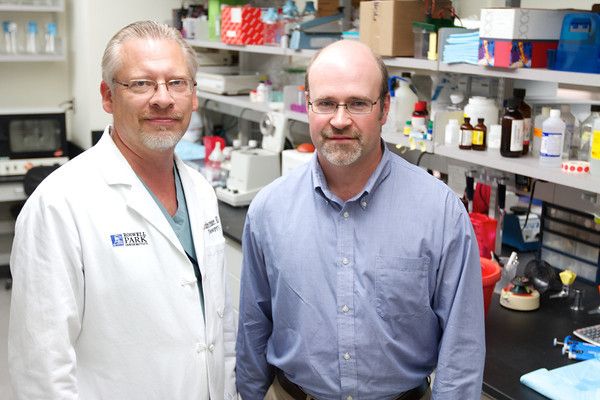Injectable immunotherapy developed by Roswell Park team shows promise as treatment for glioblastoma
- New SurVaxM research presented at Society for Neuro-Oncology Annual Meeting
- Data from multisite phase II study include patient profiles for key biomarkers
- Study shows therapy is safe, extends survival compared to historical control
BUFFALO, N.Y. — The latest results from an ongoing clinical study incorporating the immunotherapy SurVaxM as part of combination treatment for glioblastoma show that this investigational drug is safe, well-tolerated and extended survival even among the hardest-to-treat subgroups of patients. These new findings — including a molecular analysis detailing study participants’ levels of a key biomarker, MGMT — were presented Friday at the Society for Neuro-Oncology (SNO) Annual Meeting in New Orleans.
Glioblastoma is the most common and aggressive form of primary brain cancer in adults, with approximately 14,000 cases diagnosed each year in the United States. With standard therapy — surgery followed by chemotherapy (temozolomide, also known as Temodar), radiation therapy and adjuvant temozolomide — the median overall survival is 15 months. SurVaxM is a synthetic compound that stimulates the immune system to target a cancer molecule called survivin, a molecule that is highly expressed in glioblastoma and many other cancers.
Sixty-three patients with newly diagnosed glioblastoma were treated with standard of care plus SurVaxM as part of this phase II trial. The study revealed that:
- This treatment combination was well-tolerated. Observed side effects were generally mild, with no regimen-limiting toxicity attributable to SurVaxM.
- 96.7% of patients did not experience disease progression within the first six months after initiating this treatment combination.
- 94.2% of study participants were alive one year after their diagnosis, which is significantly greater than in historical studies of standard care alone.
The molecular analysis revealed a survival benefit among patients with either form of the MGMT gene, an important marker for prognosis and responsiveness to chemotherapy in patients with glioblastoma. In this study, patients with either the methylated or the unmethylated form of the MGMT gene maintained a survival benefit from SurVaxM. In addition, patients whose tumors had high levels of survivin experienced longer survival, even though survivin is known to be a predictor of poor survival in patients who receive standard-of-care treatment alone.
“Even those study participants with poor prognostic factors had much better survival than would be expected with standard care,” says SurVaxM co-inventor and study co-author Michael Ciesielski, PhD, Assistant Professor of Neurosurgery at Roswell Park and CEO of MimiVax LLC, a company working to develop and commercialize SurVaxM and other immunotherapies.
“We continue to be encouraged by the results we’re seeing from our studies with SurVaxM,” adds the study’s senior author, SurVaxM co-inventor Robert Fenstermaker, MD, Chair of Neurosurgery at Roswell Park and Chief Medical Officer at MimiVax. “The new analyses confirm our earlier findings, and we’re especially pleased to see the survival improvement among participants with unmethylated MGMT, because right now we just don’t have good options to offer those patients.”
The results were presented by first author Manmeet Ahluwalia, MD, Dean and Diane Miller Family Endowed Chair in NeuroOncology at Cleveland Clinic, in a podium presentation during the meeting. Researchers from Beth Israel Deaconess Medical Center, Dana-Farber Cancer Institute/Harvard Medical School and Massachusetts General Hospital also contributed to this research.
SurVaxM, which was invented at Roswell Park, was awarded orphan drug designation by the U.S. Food and Drug Administration (FDA) in 2017. While the current phase II study is fully enrolled and not open to new patients, further analyses will be reported, and new studies incorporating SurVaxM are expected to open at both Cleveland Clinic and Roswell Park in the coming months.
A summary of the team’s findings, “Phase II trial of a survivin immunogen (SurVaxM) for newly diagnosed glioblastoma: survivin levels and MGMT analysis” (SNO annual meeting abstract ATIM-41), is available at academic.oup.com.
Drs. Fenstermaker and Ciesielski gratefully acknowledge donations to Roswell Park in support of their work.
For more information about this study or other clinical trials available at Roswell Park, call 1-800-ROSWELL (1-800-767-9355) or send an e-mail to AskRoswell@Roswellpark.org.
###
Roswell Park Comprehensive Cancer Center is a community united by the drive to eliminate cancer’s grip on humanity by unlocking its secrets through personalized approaches and unleashing the healing power of hope. Founded by Dr. Roswell Park in 1898, it is the only National Cancer Institute-designated comprehensive cancer center in Upstate New York. Learn more at www.roswellpark.org, or contact us at 1-800-ROSWELL (1-800-767-9355) or ASKRoswell@RoswellPark.org.
Annie Deck-Miller, Senior Media Relations Manager
716-845-8593; annie.deck-miller@roswellpark.org
